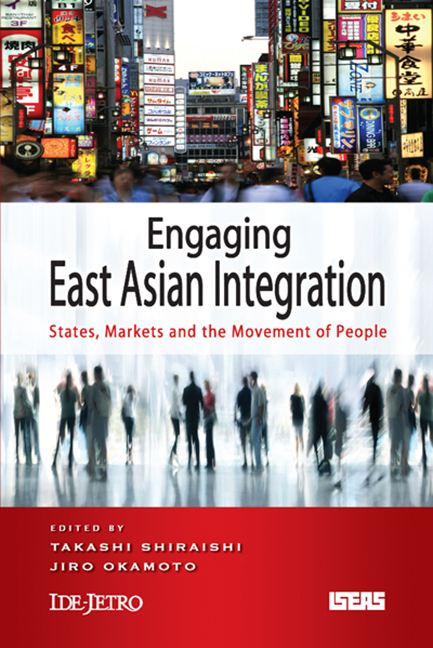Book contents
- Frontmatter
- Contents
- Foreword
- List of Figures and Tables
- Contributors
- 1 Introduction
- Part I EVOLUTION OF EAST ASIAN INTEGRATION
- Part II STATES, MARKETS AND THE MOVEMENT OF PEOPLE
- 4 Economic Integration in East Asia and Japan's Strategy
- 5 The Nature of East Asian Integration and Australia's Engagement
- 6 The Migration of Professionals in an Integrating East Asia
- 7 Panel Discussion
- Index
7 - Panel Discussion
from Part II - STATES, MARKETS AND THE MOVEMENT OF PEOPLE
Published online by Cambridge University Press: 21 October 2015
- Frontmatter
- Contents
- Foreword
- List of Figures and Tables
- Contributors
- 1 Introduction
- Part I EVOLUTION OF EAST ASIAN INTEGRATION
- Part II STATES, MARKETS AND THE MOVEMENT OF PEOPLE
- 4 Economic Integration in East Asia and Japan's Strategy
- 5 The Nature of East Asian Integration and Australia's Engagement
- 6 The Migration of Professionals in an Integrating East Asia
- 7 Panel Discussion
- Index
Summary
Shiraishi: I am supposed to wrap up the speeches and presentations made so far, but I am not going to do this because so many points were raised that I simply cannot summarize or wrap up all these. Instead, I would rather go directly into the discussion given the fact that time is quite limited. I start the discussion by raising perhaps two or three questions.
Professor Katzenstein's lecture was very comprehensive and I suspect that many people here find it quite different from the kind of discussions you normally hear about East Asian regional integration. Normally, it is economists, rather than political scientists or area specialists, who talk about integration. The kind of language deployed in discussing regional integration is very often, or almost, always economistic, but here, it is not the case and I hope that this already shows a different way of looking at regional development.
A number of people raised the question of the importance of the current [global financial] crisis. I would like to ask Professor Katzenstein about the implication of the current crisis for the American imperium.
And another thing I noted, and found quite interesting, is the point Dr Surin Pitsuwan made in his eloquent speech and excellent presentation. Dr Okamoto argued that the kind of institution building over the last ten years or more in this region is offering us quite different perspectives. Dr Surin emphasized the centrality of ASEAN as well as incrementality. Dr Okamoto agreed with some of the points Dr Surin made, but stated that ASEAN is not exactly in the driver's seat. I would like to invite Dr Okamoto as well as others to respond to this point.
And finally, I invite some of the people to think about the ways in which the region or regional institutions which have been created over the last decade can be deployed to deal with the current crisis. I have in mind, of course, the Chiang Mai Initiative, and the questions of how feasible it is, what the role of the World Bank is, and of the Japanese Government and so on. Maybe Dr Nehru can at least comment on this.
- Type
- Chapter
- Information
- Engaging East Asian IntegrationStates, Markets and the Movement of People, pp. 193 - 214Publisher: ISEAS–Yusof Ishak InstitutePrint publication year: 2012



